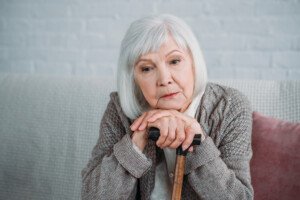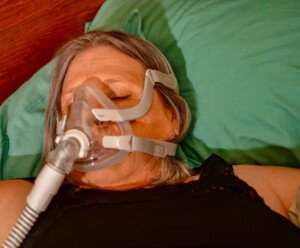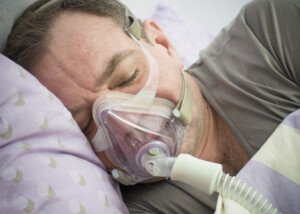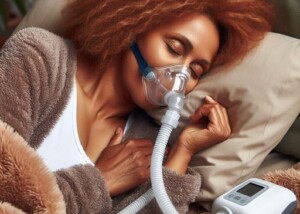
Are you elderly and have just been told you have obstructive sleep apnea? Can you still benefit from CPAP therapy? Or should you just use supplemental oxygen?
If your primary care doctor believes you’re too old to benefit from a CPAP machine, and that you should have only supplemental oxygen during sleep, you’ll want to really rethink this recommendation — even if you’re over 90.
“Supplemental oxygen is not a therapy for OSA,” says Dr. Nancy Foldvary-Schaefer, DO, MS, and Director, Sleep Disorders Center, Cleveland Clinic.
“It does not keep the airway open.”
Supplemental oxygen, delivered through a nasal cannula, will elevate the level of oxygen in the blood, and therefore, throughout the entire body.
This may sound like a fix for sleep apnea’s desaturation (abnormally low blood oxygen level).
But it’s far from it. As Dr. Foldvary-Schaefer points out, the oxygen flowing through the nasal cannula does not keep the upper airway open.
Only the pressurized air from a CPAP hose will do this.

Shutterstock/Grossinger
The airway that keeps getting blocked from collapsed throat tissue — even if supplemental oxygen is keeping the level at 99% — STILL continues to create other problems, including strain on the heart.
“We published a paper in 2019 in JCSM showing that older adults had comparable functional improvement when OSA was treated with CPAP as younger adults,” says Dr. Foldvary-Schaefer.
Another Study Showed the Same Results
A study in a 2015 European Respiratory Journal focused on CPAP benefits for the elderly.
Untreated sleep apnea in a senior man or woman is a whole separate issue from their advanced age, as far as risk or cause for health problems.
There is a distinction, however, in that in the elderly, three complications of untreated sleep apnea are far more likely than in younger patients:
• Frailty
• Nocturia: overnight trips to the bathroom
• Impaired cognition
The conclusion of the European Respiratory Journal paper is that clinicians should not be any less, or more, aggressive in treating obstructive sleep apnea in old people than in middle aged or young patients.
What about long-term benefits of CPAP in an elderly person?
“Benefits in terms of long-term reduction in cardiovascular events is debatable in old adults,” says Dr. Foldvary-Schaefer.
But there are short-term or immediate benefits to consider.
One of them is nocturia. If overnight trips to the bathroom are reduced, as a result of CPAP therapy, this means a reduced risk of falling and breaking a hip or suffering another injury — especially in an elderly person who’s unstable on their feet even when wide awake.
Another short-term benefit is increased alertness during the day, due to restorative sleep.
This means more alert driving and less daytime napping.
Elderly Person’s Oxygen Level During Sleep Is Low; Apneas Are Witnessed by Family Members
My elderly father’s breathing kept pausing for up to 35 seconds during daytime naps. He also snored and frequently fell asleep while watching TV.
An overnight pulse oximeter revealed desaturation, and he was prescribed supplemental oxygen.
I asked his doctor why he wasn’t ordered a sleep study for obstructive sleep apnea, with the idea that CPAP therapy would then be pursued.
His primary care physician replied that Kaiser Permanente didn’t recommend CPAP for suspected sleep apnea cases over 80 because — as Kaiser assumed — people that old would predictably find the face mask to be intolerable — due to physical discomfort on thin old skin, rather than age-related cognitive decline.
“Compliance is only a problem in cognitively impaired patients who do not cooperate,” notes Dr. Foldvary-Schaefer.
Another Study: CPAP Adherence in the Elderly
A paper in the American Journal of Respiratory and Critical Care Medicine (2016) points out (as does the report above) that studies on CPAP use and benefits in the elderly are few.
Neill et al set out to compare CPAP compliance in people 65+ to that of younger patients.
The researchers found that the “mean compliance in the older adults was similar to younger adults.”
However, the paper then states, “Compliance was highest in the > 75 year old group.”
Presence of diabetes or high blood pressure did not affect adherence, either. Nor did home support.
The study concluded that there was a very favorable one-month CPAP compliance in the elderly when it was “delivered as part of a patient focused protocol focusing on the first four weeks of therapy.”
If an elderly family member is suspected of having sleep apnea, encourage them to undergo a sleep study, even if they’re 95.
If they refuse, encourage a pulse oximeter test overnight. If the result shows low oxygen levels, don’t be afraid to discuss a sleep study and the benefits of CPAP therapy.

 Certified by the American Board of Neurology and Psychiatry in Neurology, Clinical Neurophysiology and Sleep Medicine,
Certified by the American Board of Neurology and Psychiatry in Neurology, Clinical Neurophysiology and Sleep Medicine, 
























